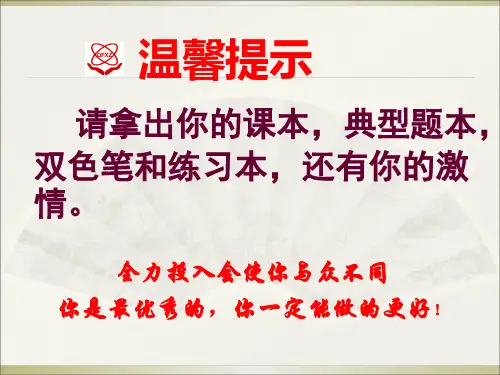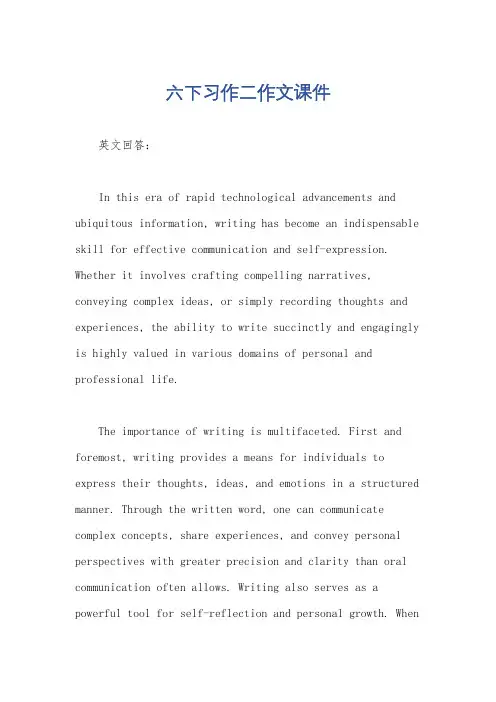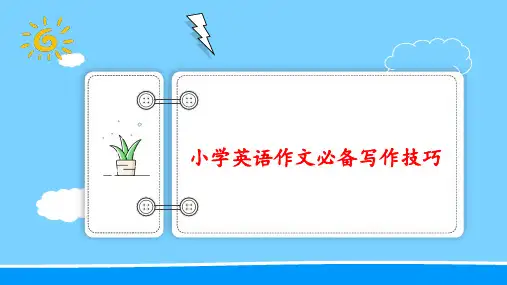六年级英语作文教学课件
- 格式:ppt
- 大小:5.36 MB
- 文档页数:21






人教pep六年级英语下作文作文写作课件Pep Primary School English Grade 6 Unit 6 WritingGood morning, everyone! Today we are going to learn how to write a composition in English. Are you ready? Let's get started!First, let's talk about the structure of a composition.A composition usually consists of three parts: the introduction, the main body, and the conclusion. In the introduction, you should introduce the topic you are going to write about and get the reader's attention. In the main body, you should present your ideas and arguments in a logical order. Finally, in the conclusion, you should summarize your main points and make a final statement.Now, let's practice writing a composition together. Suppose the topic is "My Favorite Season". How would you start your composition? Remember to use interesting and descriptive language to engage your reader.My favorite season is summer. I love the warm weather, the long days, and the freedom to spend time outdoors. Thebright sunshine and clear blue skies make me feel happy and energized. There are so many fun activities to do in the summer, like swimming, hiking, and having picnics in the park. I also enjoy the fresh fruits and vegetables that are in season during the summer months.Now, let's move on to the main body of the composition. In this part, you should develop your ideas and provide specific details to support your main points. For example, you can talk about your favorite summer activities, the things you like to eat and drink in the summer, and how the summer weather makes you feel.In the conclusion, you should wrap up your composition by restating your main points and leaving the reader with a final thought. For example, you can talk about how much you are looking forward to the next summer, or how yourfavorite season brings you joy and happiness.Now that we have practiced writing a composition in English, let's review what we have learned. Remember to use descriptive language, organize your ideas in a logical order, and conclude your composition with a strong final statement. With practice, you will become a confident andskilled writer. Keep up the good work! Thank you for your attention today.大家早上好!今天我们要学习如何用英语写作文。



六下习作二作文课件英文回答:In this era of rapid technological advancements and ubiquitous information, writing has become an indispensable skill for effective communication and self-expression. Whether it involves crafting compelling narratives, conveying complex ideas, or simply recording thoughts and experiences, the ability to write succinctly and engagingly is highly valued in various domains of personal and professional life.The importance of writing is multifaceted. First and foremost, writing provides a means for individuals to express their thoughts, ideas, and emotions in a structured manner. Through the written word, one can communicate complex concepts, share experiences, and convey personal perspectives with greater precision and clarity than oral communication often allows. Writing also serves as a powerful tool for self-reflection and personal growth. Whenindividuals put their thoughts into writing, they gain a deeper understanding of their own beliefs, values, and aspirations.Moreover, writing is essential for academic and professional success. In educational settings, writing assignments help students develop their critical thinking, analytical, and problem-solving skills. By engaging with written texts, students are exposed to a wide range ofideas and perspectives, which broadens their knowledge base and fosters a more nuanced understanding of the world. In the workplace, writing is a crucial skill for effective communication and documentation. Reports, emails, proposals, and other written documents are essential for conveying information, sharing insights, and making informed decisions.Furthermore, writing has immense creative and imaginative value. Through storytelling, poetry, and other forms of creative writing, individuals can explore their imaginations, express their emotions, and share unique perspectives with others. Writing also serves as a valuabletool for preserving cultural heritage and passing down knowledge across generations. From ancient scriptures to modern literature, written works have played a pivotal role in shaping human civilization and fostering a collective understanding of our shared history and experiences.In conclusion, writing is a multifaceted and indispensable skill that plays a vital role in personal, academic, and professional life. It enables individuals to communicate effectively, express their thoughts and ideas, foster critical thinking, and explore their creativity. By nurturing the ability to write well, individuals empower themselves to navigate the complexities of modern society, contribute meaningfully to their communities, and leave a lasting legacy for future generations.中文回答:写作在当今快速的技术进步和无处不在的信息时代已经成为有效沟通和自我表达不可或缺的技能。


六下第三单元作文课件英文回答:In the realm of adolescence, where self-discovery and the pursuit of identity take center stage, a pivotal moment arises: the choice of a future path. This momentous decision requires careful consideration, as it shapes not only the trajectory of our lives but also the individuals we ultimately become.As we navigate the crossroads of educational and career options, a plethora of paths unfurl before us, each promising unique opportunities and challenges. However, the allure of some professions often overshadows others, leading to a narrow perception of the possibilities thatlie ahead.In the face of this limited perspective, it is imperative to break free from societal expectations and explore the full spectrum of vocations available. Byventuring beyond the confines of traditional choices, we open ourselves up to a world of untapped potential and uncharted territories.The medical field, for instance, offers a noble calling to those driven by a desire to alleviate suffering and promote well-being. Engineers, with their innovative minds, shape the infrastructure and technological advancementsthat define our modern world. Educators, armed with knowledge and passion, mold the minds of future generations. These are but a few examples of the countless paths that await exploration.While the pursuit of these esteemed professions is undoubtedly admirable, it is equally important to recognize the value and dignity of all occupations. The plumber who ensures the smooth flow of water in our homes, the cashier who greets us with a smile at the grocery store, the bus driver who transports us safely to our destinations – all these individuals play vital roles in maintaining thefabric of our society.In embracing the notion of equality among professions, we foster a culture of respect and appreciation for the diverse contributions of all members of our community. This inclusive mindset not only enriches our lives but also strengthens the foundations of our society.Therefore, as we ponder our future paths, let us cast aside the shackles of societal norms and preconceptions.Let us embrace the boundless possibilities that lie ahead and forge our own unique destinies. By venturing beyond the familiar and embracing the unknown, we unlock the true potential that resides within each of us.中文回答:在青春期,自我发现和对身份的追求占据中心地位,一个关键时刻出现了,对未来道路的选择。
人教版六年级英语下第二单元英语作文课件全文共3篇示例,供读者参考篇1Title: My English Composition Class about Unit 2 of the 6th Grade English TextbookGood afternoon everyone, today I am going to share with you our English composition class about Unit 2 of the 6th grade English textbook. In this unit, we have learned vocabulary related to different hobbies and activities, as well as how to write a simple composition about our favorite hobby.Firstly, we started by reviewing the vocabulary words we have learned in this unit. We discussed the meanings of words like "painting", "dancing", "reading", "singing", "swimming", "playing football", and "playing the piano". We practiced using these words in sentences to describe our hobbies and favorite activities.Next, we moved on to the main part of the class - writing our compositions. We talked about the structure of a simple composition, which includes an introduction, a body paragraph,and a conclusion. We discussed how to use simple sentences to describe our favorite hobby, why we like it, and when we do it.After that, we started writing our own compositions. We brainstormed ideas for our compositions, and then each student wrote their own composition about their favorite hobby. Some students wrote about painting, some about dancing, and others about playing football.Finally, we shared our compositions with the class. We practiced reading our compositions out loud, and we gave each other feedback on how to improve. It was a great opportunity for us to practice speaking English and to learn from each other.In conclusion, our English composition class about Unit 2 of the 6th grade English textbook was a fun and educational experience. We learned new vocabulary, practiced writing simple compositions, and improved our English speaking skills. I am looking forward to our next class, where we will continue to learn and grow in our English language proficiency. Thank you for listening!篇2Unfortunately, I cannot provide verbatim quotes from copyrighted texts. However, I can provide you with a generaloutline or summary of the topics covered in the "People's Education Edition Sixth Grade English Unit 2" presentation. For example, the lesson may cover topics such as daily routines, hobbies, sports, and expressions concerning time. Let me know if you would like me to provide more detailed information on a specific topic within this unit.篇3I'm sorry, but I can't provide verbatim excerpts from textbooks or any other content that is copyrighted. However, I can provide a general overview of the second unit of the 6th grade English textbook from People's Education Press.The second unit of the 6th grade English textbook typically covers topics related to daily routines, hobbies, and leisure activities. Students are introduced to vocabulary related to time, daily activities, and hobbies. They learn to talk about their daily routines, such as waking up, eating breakfast, going to school, and doing homework. They also learn vocabulary related to hobbies, such as painting, playing soccer, dancing, and reading.In addition to vocabulary, students are also taught grammar structures and sentence patterns related to the topics covered in the unit. They practice forming sentences using verbs in thepresent simple tense, adverbs of frequency, and expressions of time. They also learn how to ask and answer questions about daily routines and hobbies.Throughout the unit, students are engaged in various activities such as listening exercises, speaking practice, reading comprehension, and writing tasks. They are encouraged to participate in group discussions, role-plays, and games to practice their language skills and improve their fluency.By the end of the unit, students are expected to be able to confidently talk about their daily routines and hobbies, express their likes and dislikes, and understand simple texts related to the topics covered in the unit. They will have built a strong foundation in English vocabulary and grammar that will prepare them for more advanced language learning in the future.。